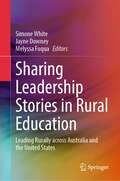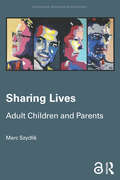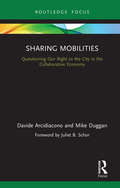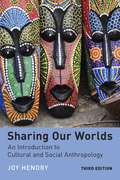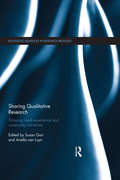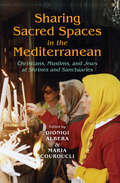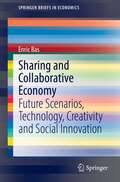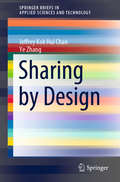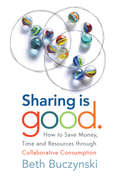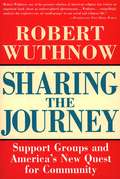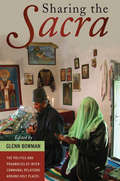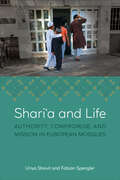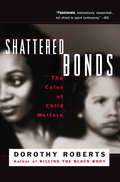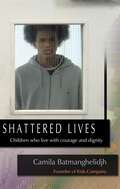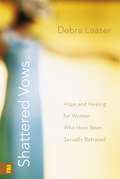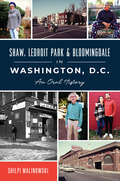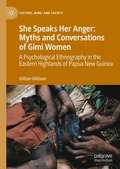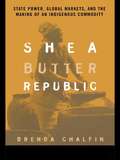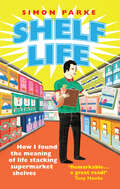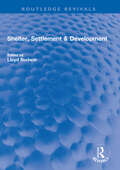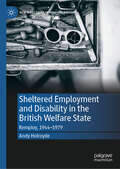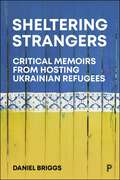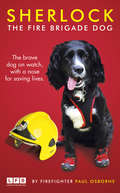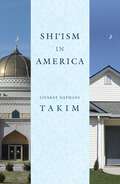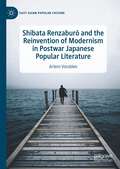- Table View
- List View
Sharing Leadership Stories in Rural Education: Leading Rurally across Australia and the United States
by Simone White Jayne Downey Melyssa FuquaThis book brings together the two fields of ‘educational leadership’ and ‘rurality’ and builds on the growing field of inquiry into the significance of ‘adding the rural’ to all aspects of education. It explores the vibrancy and variety of opportunities and challenges that are met by rural education leaders and researchers from two particular countries, Australia and the United States. It illuminates and explores the concept of rural leadership and take an educational stance, shedding light into what it means to lead rurally for educational policy, research, schools, communities and for the next generation of rural leaders themselves. It presents stories from the field with insights into capabilities, approaches, models and strategies for improving practice and outcomes. In addition to adding to the international bodies of knowledge, this volume contributes to advancements in educational leadership theories, as well as expands understanding of requisite knowledge and skills as informed by the distinct circumstances and affordances of rural contexts. This book also explores the construct of service, and explores ways in which it has been infused in various rural education leadership contexts.
Sharing Lives: Adult Children and Parents (Routledge Advances in Sociology)
by Marc SzydlikSharing Lives explores the most important human relationships which last for the longest period of our lives: those between adult children and their parents. Offering a new reference point for studies on the sociology of family, the book focuses on the reasons and results of lifelong intergenerational solidarity by looking at individuals, families and societies. This monograph combines theoretical reasoning with empirical research, based on the Survey of Health, Ageing and Retirement in Europe (SHARE). The book focuses on the following areas: ● Adult family generations, from young adulthood to the end of life, and beyond ● Contact, conflict, coresidence, money, time, inheritance ● Consequences of lifelong solidarity ● Family generations and the relationship of family and the welfare state ● Connections between family cohesion and social inequality. Sharing Lives offers reliable findings on the basis of state-of-the-art methods and the best available data, and presents these findings in an accessible manner. This book will appeal to researchers, policymakers and graduate students in the areas of sociology, political science, psychology and economics.
Sharing Mobilities: Questioning Our Right to the City in the Collaborative Economy
by Davide Arcidiacono Mike DugganThis book examines contemporary urban sharing mobilities, such as shared and public forms of everyday urban mobility. Tracing the social and economic history of sharing mobilities and examining contemporary case studies of mobility sharing services, such as Car2go, BlaBlaCar, and Uber, the authors raise questions about what these changes mean for access to and engagement with the public spaces of transport in the city. Drawing on the thought of Lefebvre, the book considers how contemporary sharing mobilities are affecting people’s ‘right to the city’, with particular attention paid to the privatised, frictionless practices of movement through the city. In addition, the authors ask what has happened to earlier forms of shared mobility and illustrate how some of these practices continue successfully today. Considering the potential that modern incarnations of shared mobilities offer to urban citizens for engaging in meaningful shared mobilities that are not simply determined by the interfaces of technology and market forces, this book will appeal to sociologists and geographers with interests in mobility and urban studies.
Sharing Our Worlds: An Introduction to Cultural and Social Anthropology (Third Edition)
by Joy HendrySharing Our Worlds offers readers the perfect introduction to cultural and social anthropology, introducing the classic theoretical ideas of its key founders and placing them in their historical and geographical context. This comprehensive text covers the anthropology’s core topics in an even-handed and illuminating manner, introducing the reader to divergent views on all of the most basic subjects, including food, hygiene, gift-exchange, rites of passage, symbolism, religion, politics, and the environment, and raising awareness of the emotional value people place on those views. Incorporating a wide array of countries, it brings the subject of cultural and social anthropology right into the neighborhood of the readers, wherever they are in the world. Written in a refreshingly accessible style, the volume offers a compelling introduction to an enigmatic and exciting subject, drawing out its relevance and value for the complex multicultural world in which we live.
Sharing Qualitative Research: Showing Lived Experience and Community Narratives (Routledge Advances in Research Methods)
by Ariella Van Luyn Susan GairIn an era of rapid technological change, are qualitative researchers taking advantage of new and innovative ways to gather, analyse and share community narratives? Sharing Qualitative Research presents innovative methods for harnessing creative storytelling methodologies and technologies that help to inspire and transform readers and future research. In exploring a range of collaborative and original social research approaches to addressing social problems, this text grapples with the difficulties of working with communities. It also offers strategies for working ethically with narratives, while also challenging traditional, narrower definitions of what constitutes communities. The book is unique in its cross-disciplinary spectrum, community narratives focus and showcase of arts-based and emerging digital technologies for working with communities. A timely collection, it will be of interest to interdisciplinary researchers, undergraduate and postgraduate students and practitioners in fields including anthropology, ethnography, cultural studies, community arts, literary studies, social work, health and education.
Sharing Sacred Spaces in the Mediterranean: Christians, Muslims, and Jews at Shrines and Sanctuaries (New Anthropologies of Europe)
by Dionigi Albera Maria Couroucli“Will spark debate . . . and hopefully further research into points of contact between the monotheistic religions, and others.” —The Levantine ReviewWhile devotional practices are usually viewed as mechanisms for reinforcing religious boundaries, in the multicultural, multiconfessional world of the Eastern Mediterranean, shared shrines sustain intercommunal and interreligious contact among groups.Heterodox, marginal, and largely ignored by central authorities, these practices persist despite aggressive, homogenizing nationalist movements. This volume challenges much of the received wisdom concerning the three major monotheistic religions and the “clash of civilizations,” as contributors examine intertwined religious traditions along the shores of the Near East from North Africa to the Balkans.
Sharing and Collaborative Economy: Future Scenarios, Technology, Creativity and Social Innovation (SpringerBriefs in Economics)
by Enric BasThis book presents a foresight-based exploratory analysis on the coming post-capitalist society and the transforming role of technology, creativity, and social innovation in the new economy. Topics analyzed include innovation culture, the role of politics, legal protection, the digitalization of social life, as well as vulnerabilities and opportunities of the Sharing & Collaborative Economy (ShE). ShE is here essentially understood just as a proof of the current Zeitgeist; a sign of its time. A time, where the formal social structures and institutions which traditionally have shaped and framed human societies are - slowly but progressively- getting dissolved into a new emerging social system, complex and mutant by nature. The book subsequently presents three plausible scenarios for ShE as the outcome of this analysis in the horizon of 2030: 1) the probable future, balancing neoliberalism: the shared/collaborative economy as a new third way, 2) the contingent/rupturist future, hypercapitalism: neoliberalism on steroids, or the collaborative paradigm as a trojan horse, and 3) the preferable future, postcapitalism, or the sharing economy as the poster child of the 4th industrial revolution. It connects these three scenarios with a change of paradigm where horizontal management, cultural diversity, social responsibility, climate change management, and the transformative power of radical creativity and participation are finally getting a leading role in the design of brand new ways of approaching a more integrative and sustainable business and economy.
Sharing by Design (SpringerBriefs in Applied Sciences and Technology)
by Jeffrey Kok Chan Ye ZhangThis book answers the question of how to design a sharing system that can promote sustained, meaningful, and socially constructive sharing practices in today’s cities. To do so, it constructs a framework for practical inquiry into the design of sharing systems. Further, the book invites readers to consider questions such as: If sharing can be designed, then how does one design a sharing system for cities? Which urban conditions make this sharing system possible? What are the considerations, variables, and methods that can inform and guide the designers of a sharing system? By considering both the environmental and societal motivations for sharing, and the reality that most examples of the Sharing Economy are neither equitable in their socio-economic outcomes nor genuine in their original social promises, this book presents balanced and thoughtful answers to the questions posed above. The book will appeal to a broad readership, from students and teachers in the various design disciplines, to professionals and scholars in architecture and urbanism, business and innovation, and other related fields of the humanities and social sciences, as well as activists and policymakers committed to achieving more sustainable and equitably distributed access to urban resources.
Sharing is Good
by Beth BuczynskiCollaborative consumption is a new way of living in which access is valued above ownership, experience is prized over material possessions, and "mine" becomes "ours," allowing everyone's needs to be met with minimum waste. Bursting at the seams with hundreds of helpful tips and valuable resources, Sharing is Good is a practical guide to this new and exciting "sharing economy."
Sharing the Journey
by Robert WuthnowA look at how support groups have affected American society argues that, although support groups provide a warmth and security that holds society together, they can lead to an unhealthy self-absorption and a trivialized sense of what is sacred.
Sharing the Sacra
by Glenn Bowman"Shared" sites, where members of distinct, or factionally opposed, religious communities interact-or fail to interact-is the focus of this volume. Chapters based on fieldwork from such diverse sites as India, Nepal, Sri Lanka, China, Turkey, Morocco, Tunisia, and Vietnam demonstrate how sharing and tolerance are both more complex and multifaceted than they are often recognized to be. By including both historical processes (the development of Chinese funerals in late imperial Beijing or the refashioning of memorial commemoration in the wake of the Vietnam war) and particular events (the visit of Pope John Paul II to shared shrines in Sri Lanka or the Al-Qaeda bombing of an ancient Jewish synagogue on the Island of Djerba in Tunisia), the volume demonstrates the importance of understanding the wider contexts within which social interactions take place and shows that tolerance and intercommunalism are simultaneously possible and perpetually under threat.
Shariʿa and Life: Authority, Compromise, and Mission in European Mosques
by Uriya Shavit Fabian SpenglerDrawing on five years of field studies in pragmatic- and dogmatic-inclined mosques across Europe, Shariʿa and Life explores how Muslims engage with shariʿa norms in general, and specifically with the challenges they face as Muslims living in majority non-Muslim societies. The book examines how fatwas (advice on shariʿa-related matters) are quested, negotiated, paraphrased, contested, or ignored in mosques, on the internet, and elsewhere. It also analyses individual strategies, external to religio-legal discourse, through which Muslims mitigate conflicts between interpretations of shariʿa and everyday life. Among the issues discussed in the book are financial transactions, education, the workplace, sports, electoral participation, Christmas greetings, proselytizing, and the legitimacy of choosing to live in a non-Muslim country. Shifting the focus from the authors and texts of fatwas to their recipients, Shariʿa and Life gives voice to those often left voiceless and demonstrates the great discretion and flexibility with which tensions between shariʿa and life are resolved.
Shattered Bonds: The Color Of Child Welfare
by Dorothy RobertsShattered Bonds is a stirring account of a worsening American social crisis--the disproportionate representation of black children in the U. S. foster care system and its effects on black communities and the country as a whole. Tying the origins and impact of this disparity to racial injustice, Dorothy Roberts contends that child-welfare policy reflects a political choice to address startling rates of black child poverty by punishing parents instead of tackling poverty's societal roots. Using conversations with mothers battling the Chicago child-welfare system for custody of their children, along with national data, Roberts levels a powerful indictment of racial disparities in foster care and tells a moving story of the women and children who earn our respect in their fight to keep their families intact.
Shattered Lives: Children Who Live with Courage and Dignity
by Camila Batmanghelidjh*Shortlisted for the Young Minds Book Prize 2006* Shattered Lives bears witness to the lives of children who have experienced abuse and neglect, and highlights the effects of early traumatic episodes. Chapters take the form of letters to a child capturing their life experiences, hugely impacted by sexual abuse, parental substance misuse and loss, leading to feelings of shame, rejection and worthlessness. Batmanghelidjh offers understanding for those baffled by these hard-to-reach children and warns against stigmatizing them for their problem behaviour. In her critique of existing structures, she exposes the plight of children who are overlooked by the authorities and denounces those who value bureaucracy over the welfare of the individual child. Society's failure to acknowledge the truth of their experiences and act to change the environment in which such mistreatment can flourish is, she strongly argues, leading to the death of childhood. The book is a clarion call for change.
Shattered Vows: Hope and Healing for Women Who Have Been Sexually Betrayed
by Debra LaaserThis sensitive and practical guide offers proven tools that help women struggling with sexual betrayal make wise and empowering decisions. Shattered Vows is inspired by the author's personal journey through betrayal, her extensive work with hundreds of hurting women, and her intimate marriage two decades after the disclosure of her husband's infidelity.
Shaw, LeDroit Park & Bloomingdale in Washington, D.C.: An Oral History (American Heritage)
by Shilpi MalinowskiLet residents tell you what it's been like to live in D.C.'s most gentrified neighborhood. When Gretchen Wharton came to Shaw in 1946, the houses were full of families that looked like hers: lower-income, African American, two parents with kids. The sidewalks were full of children playing. When Leroy Thorpe moved in in the 1980s, the same streets were dense with drug markets. When John Lucier found a deal on a house in Shaw in 2002, he found himself moving into one of four occupied homes on his block. Every morning, he waited by himself on the empty platform of the newly opened metro station. When Preetha Iyengar became pregnant with her first child in 2016, she jumped into a seller's market to buy a rowhouse in the area. Journalist and Shaw resident Shilpi Malinowski explores the complexities of the many stories of belonging in the District's most dynamic neighborhood.
She Speaks Her Anger: A Psychological Ethnography in the Eastern Highlands of Papua New Guinea (Culture, Mind, and Society)
by Gillian GillisonTaking a novel approach that adapts Freud’s theory of the Primal Crime, this book examines a wealth of ethnographic data on the Gimi of the Eastern Highlands of Papua New Guinea, focusing on women’s lives, myths, and rituals. Women’s and men’s separate myths and rites may be ‘read’ as a cycle of blame about which sex caused the ills of human existence and is still at fault. However, the author demonstrates that in public rites of exchange in which both sexes participate, men appropriate and subvert women’s usages as a ritual strategy to ‘undo’ motherhood and confiscate children at puberty. In doing so, she reveals how Gimi women both rebel against the male-dominated social order and express understanding of why they also acquiesce. The result of decades of fieldwork, writing and reflection, this book offers an analysis of Gimi women’s complex understanding of their situation and presents a nuanced picture of women in a society dominated by men. It represents an important contribution to New Guinea ethnography that will appeal to students and scholars of psychoanalysis, gender studies, and cultural, social and psychoanalytic anthropology.
Shea Butter Republic: State Power, Global Markets, and the Making of an Indigenous Commodity
by Brenda ChalfinShea butter (butyrospermin parkii) has been produced and sold by rural West African women and circulated on the world market as a raw material for more than a century. Shea butter has been used for cooking, making soap and candles, leatherworking, dying, as a medical and beauty aid, and most significantly, as a substitute for cocoa butter in chocolate production. Now sold in exclusive shops as a high-priced cosmetic and medicinal product, it caters to the desire of cosmopolitan customers worldwide for luxury and exotic self-indulgence. This ethnographic study traces shea from a pre- to post-industrial commodity to provide a deeper understanding of emerging trends in tropical commoditization, consumption, global economic restructuring and rural livelihoods. Also inlcludes seven maps.
Shelf Life: How I Found The Meaning of Life Stacking Supermarket Shelves
by Simon ParkeThe day I was appointed Chair of the shop union was the same day the Pope was elected. There the similarities end, however. For while his elevation took place beneath the fine art of the Sistine Chapel, with the mysterious white smoke rising, mine took place in the cold store, with nothing more mysterious than the bacon delivery and yesterday's waste...A vicar for twenty years, Simon Parke trades in his dog collar for a job on the tills in his local supermarket. Among the vegetable aisles and dairy produce he unpacks the meaning of life with his fellow workers, a colourful bunch. Sonny the security guard hates conflict; shelf-filler Winston knows he is destined for something better; and voluptuous Faith is generous with her wares - but sadly not with Simon. You don't have to be off your trolley to work there, but it helps...From checkout charlies to banana rage, from short-changed lows to cold store highs, Shelf Life is a pick-n-mix of wit and wisdom for anyone who loves life and hopes for more - no matter where they find themselves.
Shelter, Settlement & Development (Routledge Revivals)
by Lloyd RodwinFirst published in 1987, Shelter, Settlement & Development presents a comprehensive and authoritative reappraisal of shelter, settlement and development policies and programs in third world countries. Drawing on the considerable research and advisory experience of an internationally distinguished group of contributors, it introduces new ideas on many themes such as spatial strategies, land policy, shanty town settlements, infrastructure standards and construction obstacles, intricacies of housing finance and household behaviour and preferences. Each facet of the study sums up what can be inferred from past experience: what worked and what did not, and why; what ideas are in currency; what policy choices lie ahead; and most important of all, what further changes are needed to achieve feasible and effective solutions, not quick fixes, or one-shot remedies. There is a special focus on the necessary learning processes so that whatever action is taken is likely to be self-correcting in the light of subsequent experience, reflection and changing circumstances. This book is an essential read for scholars and researchers of development studies, urban studies and planning, and public policy.
Sheltered Employment and Disability in the British Welfare State: Remploy, 1944–1979 (New Directions in Welfare History)
by Andy HolroydeThis book explores sheltered employment for disabled people in the British welfare state, focusing on Remploy as the flagship provider. It considers the fundamental areas of understanding Remploy, in terms of why it was created, how it functioned, who it employed, and how far it came to dominate the wider field of provision. The book further uses sheltered employment as a new lens through which to explore key aspects of the welfare state in the period. These include the creation of the post-war settlement; the extent of political consensus; the exclusion of disabled people from welfare and work; the role played by gendered thinking in the welfare state&’s provisions; and the relationship between the state and voluntary sectors. In so doing, it sheds new light on the history of disability, employment, and welfare in Britain.
Sheltering Strangers: Critical Memoirs from Hosting Ukrainian Refugees
by Daniel BriggsThis book documents the intimate lives of Ukrainians as they fled their homeland in search of a safe and stable place to stay. The critical memoirs follow the lives of 16 Ukrainian families in a small Spanish town near Madrid and the local families that volunteered to host them during a time of limited state support and an absence of a clear EU plan for the refugees. Through first-hand testimonies, social media messages and photographs, the book reveals the scarring realities of the Ukrainians’ upheaval, displacement and trauma alongside the well-meaning sacrifices made by the host families which quickly mutate into moralistic and meritocratic expectations of their new guests. In doing so, the book offers a vivid portrayal of how the tensions of war and displacement play out in real life in real time.
Shi'ism in America
by Liyakat Nathani TakimAn authoritative introduction to the Shi&’i community in America, tracing its history, composition, and the development of American Shi&’i identity. There are over two million Shi&’is Muslims in the United States. With community roots going back sometimes close to one hundred years, Shi&’is can be found in major cities like New York, Los Angeles, Chicago, Washington, and Dearborn, Michigan. Early in the century, Shi&’is and Sunnis sometimes arrived at the same time, worshipped together, shared similar experiences, and confronted the same challenges despite their sectarian differences. In this comprehensive study, Liyakat Nathani Takim provides an in-depth account of the American Shi&’i experience. Both tracing the early history and illuminating the more recent past with surveys and interviews, Takim explores the life of this community. Filling an important scholarly gap, he also demonstrates how living in the West has impelled the Shi&’i community to grapple with the ways in which Islamic law may respond to the challenges of modernity. Shi&’ism in America provides a much-needed overview of the history of this United States religious community, from religious, cultural, and political institutions to inter-group relations, to the experience of African American Shi&’is.
Shibata Renzaburō and the Reinvention of Modernism in Postwar Japanese Popular Literature (East Asian Popular Culture)
by Artem VorobievShibata Renzaburō and the Reinvention of Modernism in Postwar Japanese Popular Literature explores the life and work of Shibata Renzaburō (柴田錬三郎, 1917–1978), the author of adventure and historical novels who was instrumental in reinvigorating popular Japanese literature in the postwar period. This book considers postwar Japanese society through the prism of Shibata’s writing, exploring how the postwar period under SCAP Occupation influenced Shibata’s writing and generated the extraordinary popularity of samurai fiction in the postwar era at large. Through the use of a nihilistic warrior, Nemuri Kyōshirō, and other samurai characters, Shibata Renzaburō addresses important social issues of the day, such as the trauma of defeat, postwar reconstruction, and the attending societal ills and neuroses, while keeping his literature entertaining and easy to read, which ensured its mass appeal in postwar Japan.
